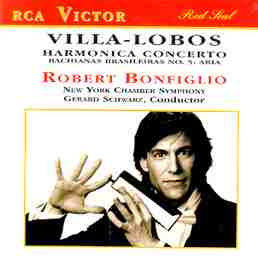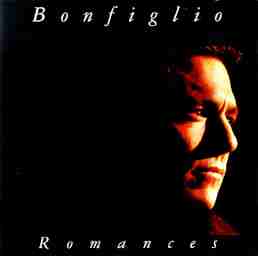The Free-Reed Review
Critiques of Compact Discs, Books and Music Scores
Double CD Review:
CD No. 1: Robert Bonfiglio
Villa-Lobos Harmonica Concerto

total time: 63:30
Released in 1988
review date: April 1999
Label: RCA Victor Red Seal
Order from: Out of Print.
|
Villa-Lobos Harmonica Concerto
Robert Bonfiglio, harmonica
New York Chamber Orchestra
Gerard Schwarz, conductor
Program:
- Harmonica Concerto
- Allegro moderato
- Andante; piu mosso
- Allegro
- Bachianas Brasileiras No.5: Aria
- Evocação
- O Canto do Cisne Negro - Nesta Rua
- João Cambuête
- Samba-Clássico
- Remeiro de São Francisco
- Papai Curumiassú
- Lundú da Marqueza de Santos
- Xangó - Mando Tiro, Tiro la
- Canção do Marinheiro
- Viola Quebrada
- Improviso No. 7
All compositions by Heitor Villa-Lobos (1887-1959)
|
CD No. 2: Romances

total time: 60:32
Released in 1991
Label: High Harmony
Order from: The Classical Free-Reed, Inc.
Online Gift Store
|
Robert Bonfiglio, harmonica (with orchestra)
Bruce Ferden, conductor
Program:
- Debussy: Rêverie
- Myers: Cavitina
- Saint-Saens: The Swan
- Boublil/ Schoneberg/ Matlby,Jr.: The Last Night of the World
- J.S. Bach: Ariso
- Ravel: Pavane Pour une Infante défunte
- Sondheim: Send in the Clowns
- Tárrega: Recuerdos de la Alhambra
- Massenet: Meditation from "Thaïs"
- Bonfa: Manhnã de Carnival
- The Wind Beneath My Wings
- Mozart: Piano Concerto No. 21
- Chopin: Prelude, Op. 28 No.4
- Vaughan Williams: Romance for Harmonica, Strings and Piano
|
Review by Henry Doktorski:
Robert Bonfiglio has quite a reputation: he has been a concerto soloist
with dozens of symphonies around the world. * In addition, he has an
extensive classical repertoire including concertos by Villa-Lobos,
Alexander Tcherepnin, Malcom Arnold and Alan Hovhaness. **
It was a real pleasure for me to listen to these CDs, as the Villa-Lobos
Concerto for Harmonica (1955-56) and the Vaughan Williams
Romance for Harmonica, Piano and String Orchestra (1952) are two of
the greatest works in the classical harmonica repertoire. (For more
information about these two works see Interview with Larry Adler and The Classical Harmonica.)
Truly both of these CDs are five-star recordings. Bonfiglio's technique
and interpretations are superb. Such beautiful tone he coaxes from his
instrument, a Hohner chromatic harmonica. The rapid scale passages and the
lightning-fast arpeggios in the Villa-Lobos concerto were flawlessly
executed. I especially enjoyed the 2 ½ minute-long solo cadenza in the
third movement. Two-voice counterpoint on the harmonica is as rare (and as
difficult) as double-stop counterpoint on the violin, but Bonfiglio tosses
it off easily. I'm not surprised, as he has performed this concerto more
than 160 times with orchestras throughout the world!
Considering my taste in music, my favorite pieces on the two CDs were the
Villa-Lobos concerto and the Vaughan Williams Romance (the only two works
on the program which were originally written for harmonica). The Vaughan
Williams Romance is a powerful work; his composition is
structurally satisfying and characteristically true to his style. One part
in particular reminded me of the striking and original harmonies from
Vaughan Williams' Symphony Antarctica.
The transcriptions, as well as the original pieces, are also beautiful
works; several were arranged for harmonica and orchestra by Bonfiglio
himself. (Bonfiglio studied composition with Charles Wuorinen and Aaron
Copland and received a Masters degree in composition from the Manhattan
School of Music.) Certainly composition and arranging are valuable assets
for a classical mouth organist—a performer of an instrument rarely
heard in classical music circles. Due to the scarcity of material, it is
not surprising that Bonfiglio wrote some of the arrangements himself.
Bonfiglio's arrangements were every bit as convincing as all the other
arrangements on the album; he is a multi-talented musician—well
rounded.
If I have any criticisms, they are minor, and deal exclusively with the
second CD—Romances. This CD—which includes several hits from
Broadway musicals and Hollywood movies such as: Cavitina (The
Deerhunter), The Last Night of the World (Miss Saigon), Send in
the Clowns (A Little Night Music) and Manhnã de Carnival (Black
Orpheus)—is, with few exceptions, filled with meditative and relaxing
pieces, stuff that tended to put me to sleep. The Villa-Lobos album, on
the other hand, had a nice contrast in tempo and dynamics between the
various selections. In Romances I would have preferred that the
slow pieces be interspersed with some lively energetic pieces to relieve
the monotony. It would have been nice to hear more than one movement (the
slow movement) from the Mozart piano concerto. The other allegro
movements would have increased the pace.
Of course, the choice of pieces on the program was probably up to the
producer, not the artist. In any case, my personal opinions do not in any
way detract from the beauty of Romances. The CD cover (the booklet
notes are so short as to be practically nonexistent) does not claim to be
any more than beautiful "easy-listening" music—romance music—despite
the inclusion of the more serious virtuosic Vaughan Williams
Romance at the end of the CD.
In conclusion, allow me to share with you the story of this RCA recording
of the Villa-Lobos concerto, as it was told to me by Robert Bonfiglio
himself. I believe this is important, as it serves to point out the
unpredictable whimsy (and shortsightedness) of the modern music industry.
If memory serves me correctly, this is how he explained it to me:
Around 1988, Bonfiglio was "discovered" by an executive of RCA Victor, who
decided to record two CDs. The company spared no expense; they hired the
New York Chamber Symphony and famed conductor Gerard Schwartz, and
spent something like $250,000 in the process. Bonfiglio was suddenly a
national celebrity and appeared on network radio and television. (Not only
is Bonfiglio exceptionally talented, but also exceptionally handsome—an
important factor in the commercial music business.) His Christmas album
sold ten thousand copies in fifteen minutes during one nationally
broadcast television commercial. (Viewers dialed an 800 number to order
the CD.)
Bonfiglio appeared on "CBS Sunday Morning," "CBS Morning Show," "Live with
Regis and Kathy Lee," "Larry King," and Garrison Keillor's "American Radio
Show." He had feature stories and reviews in the New York Times, the
Boston Globe, the Los Angeles Times, the Washington Post and the Chicago
Tribune. In a nutshell: his career skyrocketed like a meteor shooting
through the sky.
Then disaster struck. The key RCA executive who "discovered" him, was
either fired or transferred to another department. The new executive was
not so favorable enamored of Bonfiglio (in fact, he was down-right
hostile!) and decided to cut the harmonica virtuoso from their line of
artists. They even recalled his CDs and stopped selling them.
At the time, Bonfiglio was devastated; he actually had to pay RCA
thousands of dollars to purchase the rights to his CDs so he could sell
them himself!
But Bonfiglio was not defeated; much to his credit, he continued to
perform concerts all over the world and promote the harmonica.
I recently had the pleasure of meeting him at a
concert in New York City early last month (March 1999) and can personally
testify to his enthusiasm and endurance.
The New York Post called him "America's leading harmonica virtuoso" and I do too! If you call yourself a classical free-reed connoiseur, you owe it to yourself to add these CD treasures to your collection. You will not be disappointed!
* Bonfiglio has performed as soloist with the symphonies of Indianapolis, Oregon, San Antonio, Tucson, Milwaukee, Wichita, Portland, Spokane, Santa Barbara, Knoxville, South Bend, New Orleans, Florida, Utah, and the Los Angeles Philharmonic as well as Puerto Rico, Hong Kong, Costa Rica, Columbia, North Holland, Bilbao, Seville under such great conductors as Gerard Schwarz, Lucas Vis, Jorge Mester, Theo Alcantara, Robert Bernhardt, JoAnn Falletta, Bruce Ferden, Giséle Ben-dor, Christopher Wilkins, Kirk Trevor and Lucas Foss.
** Bonfiglio's classical repertoire includes:
- Villa-Lobos: Harmonica Concerto
- Vaughan Williams: Romance for Harmonica, Strings and Piano
- Alexander Tcherepnin: Harmonica Concerto
- Malcolm Arnold: Harmonica Concerto
- Darius Milhaud: Suite for Harmonica and Orchestra
- Gordon Jacob: Five Pieces for Harmonica and String Orchestra
- Alan Hovhaness: Harmonica Concerto
- Alan Hovhaness: Greek Folk Dances for Harmonica and Strings
- Dello Joio: Concertino for Harmonica and Orchestra
- Arthur Benjamin: Harmonica Concerto

